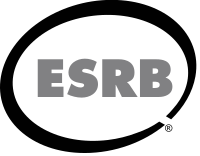Entertainment Software Rating Board
From Retro CDN
The Entertainment Software Rating Board (ESRB) is a self-regulatory organization that puts ratings into force, advertising guidelines, and online privacy principles for computer and video games and other entertainment software in North America.
The ESRB was established in 1994 by the Entertainment Software Association (formerly Interactive Digital Software Association). In early 2003, it had rated over 8,000 titles that had been submitted by 350 publishers.
One of the reasons the ESRB was founded was due to violent content found in video games such as Mortal Kombat and Doom, as well as other controversial video games portraying overly violent or intense sexual situations at the time.
Rating process
To obtain a rating for a game, a publisher sends the ESRB videotaped footage of the most graphic and extreme content found in the game. The publisher also fills out a questionnaire describing the game's content and pays a fee based on the game's development cost:
- $800 fee for development costs under USD $250k
- $4,000 fee for development costs over $250k
On its website, the ESRB states that three trained raters, working independently, watch the footage and recommend a rating. If all raters agree on the rating, content descriptors are added and the ESRB notifies the publisher of its decision. If there is no consensus, additional raters review the footage and materials, or the majority opinion rules. After the rating is agreed upon, the ESRB in-house personnel review the footage and all materials to ensure that all information is accurate and a certificate is sent to the publisher. However, that decision is not final. If the publisher wishes, they may edit the game and resubmit the footage and questionnaire in order to achieve a lower rating, or appeal the information. If this is the case, the process begins anew. The publisher may also appeal the game's rating if they wish. The appeals committee is composed of entertainment software industry representatives.
When the game is ready for release, the publisher sends copies of the final version of the game to the ESRB. The game packaging is reviewed, and the ESRB says that its in-house personnel randomly play games to ensure that all the information provided during the rating process was complete and accurate. Penalties may apply to the publisher if it is eventually found, either through the in-house personnel's playing or consumer comments that the game's content is more extreme than the publisher stated in its application.
The identities of the ESRB raters are kept confidential and selected randomly from a pool of full-time ESRB employees who live in the New York City area. According to an ESRB introductory brochure from 1994: "The raters represent a wide range of backgrounds, races, and ages and have no ties to the interactive entertainment industry. Raters include retired school principals, parents, professionals, and other individuals from all walks of life." In essence allowing people who aren't regular video game players, to review games as if they were the customer and receiving their first glance at the game. They are then required to take testing before becoming ESRB raters.
See also
- Australia - Australian Classification Board
- Brazil - Department of Justice, Rating, Titles and Qualification
- Europe (excluding Germany) - Pan European Game Information
- Germany - Voluntary Monitoring Organisation of Entertainment Software
- Japan - Computer Entertainment Rating Organization
- Korea - Game Rating Board
- United Kingdom - British Board of Film Classification
